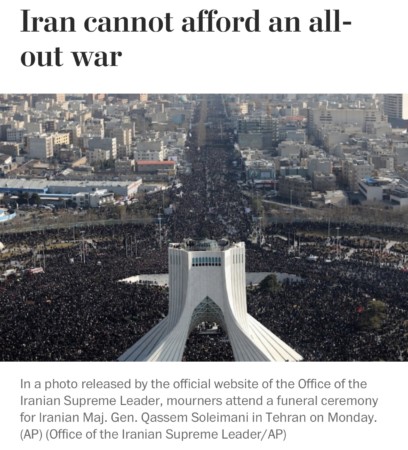Soleimani was only a “general” according to Iran’s brutal regime. The international community saw him for what he was: a thug. The United Nations sanctioned Soleimani for proliferation-sensitive nuclear activities in 2007. Despite a travel ban, he still made frequent trips to Lebanon, Syria and Iraq. There, his Quds Force oversaw the funding and training of terrorist groups acting as Iranian proxies. These groups killed more than 600 American servicemembers in Iraq, wounded thousands more, threatened U.S. diplomats, kidnapped U.S. citizens and spread chaos throughout the region. They also aided the murderous regime of Bashar al-Assad in slaughtering hundreds of thousands of Syrians, and were responsible for attacks against Israel, Saudi Arabia and the United Arab Emirates.
Multiple administrations attempted to counter Soleimani’s activities with sanctions and surveillance. That wasn’t enough to stop the increasing wave of Quds Force-sponsored aggression and violence. The Obama administration signed a nuclear agreement with Iran, which released more than $100 billion to the Iranian regime and helped fuel, rather than halt, the Quds Force’s support for terrorism, something then-Secretary of State John F. Kerry admitted could happen.
Over the past eight months, Iran escalated its asymmetric aggression — it directed attacks against our partners’ oil tankers, downed a U.S. drone and struck a major Saudi oil facility. In response, the Trump administration ramped up sanctions, bolstered force protection in the region and worked to deepen Iran’s diplomatic isolation. Still, the president did not respond militarily to Iran’s provocations. Like previous administrations, the Trump White House was concerned that Iran would react to a military escalation by directing Soleimani’s Quds Force proxies to attack U.S. diplomats, troops and facilities in the region.
However, the killing of a U.S. citizen in Iraq last week, and Soleimani’s role in planning and directing attacks against U.S. troops and diplomats, showed that restraint was not keeping Americans safe.
One day before the strike on Soleimani, Iran’s supreme leader, Ayatollah Ali Khamenei, tweeted at President Trump, “You can’t do anything.” The regime believed it would never face consequences for its aggression. The president’s bold decision shocked Tehran, and upended the supreme leader’s assumption that Iran could decimate international norms of behavior without consequence.
Moving forward, we must prepare for the unfortunate probability that Tehran will choose escalation and bloodshed over diplomacy and negotiation. The administration should work with Congress to enhance the protection of our troops and strengthen embassy security in the region. The administration is already scheduled to brief Congress this week, so all members can have a full understanding of the specific threats Iran poses.
I encourage the administration to share the maximum amount of intelligence possible without jeopardizing our sources. This will foster a greater bipartisan appreciation of the context in which the president is acting to save American lives. Defense Secretary Mark T. Esper and Army Gen. Mark A. Milley, the chairman of the Joint Chiefs of Staff, have provided constant updates. I look forward to maintaining this communication as we work toward deescalation in one of the most volatile parts of the world.
We should also be prepared for a political reaction from countries where the Quds Force is most active, and respond cautiously. Key example: the Iraqi parliament’s vote to expel U.S.-led coalition troops. After Iraqi leadership did nothing to protect our Embassy in Baghdad from Iranian-backed militias, it’s easy to worry that Iraq is lost to Tehran.
The removal of coalition troops from Iraq would be shortsighted and self-defeating. Nearly half of Iraq’s parliament boycotted the vote, and Iraqis have been protesting Iran’s corrupt presence for months. The United States still has partners in Iraq. We still have the opportunity to maintain our presence, which is vital for combating the Islamic States and countering Iran.
The administration should also ensure that the door for deescalation with Iran remains open. Indeed, the president has repeatedly stressed his willingness to negotiate an end to the stand off, if not a broader agreement that would address all of Iran’s nefarious behavior. When cooler heads prevail, Tehran might conclude that deescalation is its best option, if only because Iran is strangled economically by sanctions and beset by domestic protests. Simply put, Iran cannot afford an all-out war, and we don’t desire one either.






Leave a Reply